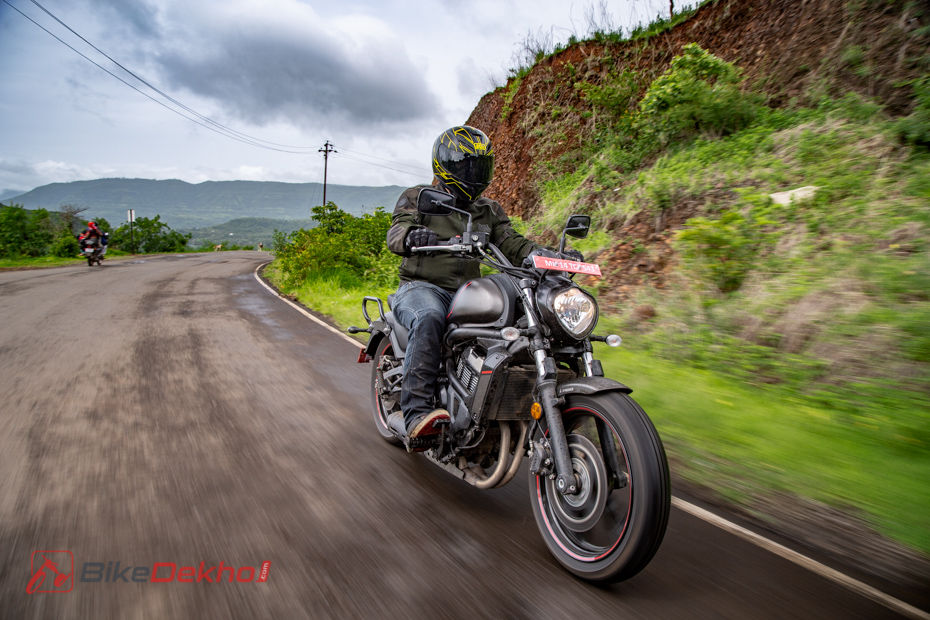Kawasaki Vulcan S BS6: Road Test Review
Published On Jul 4, 2021 By Gaurav Sadanand for Kawasaki Vulcan S
- 2628 Views
- Write a comment
Have the strict emission norms robbed the Vulcan S of its performance?

We haven’t had too many options in the mid-displacement cruiser range since the culling of the Harley Davidson Street 750 and the Street Rod -- rivals Kawasaki intended to beat with its very own Vulcan S. As the only 650cc cruiser available in India, the Vulcan S has a lot going for it. It was even updated to meet the BS6 emission norms in August last year but have the new regulations robbed the bike of its
performance?
PROS
- Wide and comfortable seat with good cushioning.
- Lively bottom and mid-range performance.
- Brakes have great bite, progression, and feedback.
CONS
- Cat-con keeps scraping against speed-breakers thanks to low ground clearance.
- Swept-back handlebar position is a bit odd which tends to get uncomfortable over time.
- Build quality of the switchgear could have been better.
STANDOUT FEATURES
- Kawasaki offers 'Ergo Fit' on the Vulcan S which allows the dealer to adjust the handlebar, seat height, and footpegs as per the user’s preference.
ENGINE & PERFORMANCE

- You’d probably expect the BS6 Vulcan S to lose out on performance due to the restrictive cat-con and retuned ECU, but that isn't the case.
- In fact, Kawasaki has managed to extract the same performance figures from the BS6 model while improving its bottom-end performance.
- As a result, the BS6 Vulcan is progressively quicker to get to 100kmph, despite being 0.6Nm down on torque.
- The quick-revving engine feels at ease, be it in the city or out on the highways, however, it isn’t the smoothest parallel-twin out there.
- Mild vibes do creep in through the rev range, but they never get irritating at any point.

- Improved fuel efficiency has been the highlight of the BS6 transition for most motorcycles.
- The BS6 Vulcan may not be as frugal as the BS4 model but it’s quite close. The variation in fuel efficiency could also boil down to the different testers and their respective riding styles.
RIDE & HANDLING

- The stretched wheelbase on the Vulcan is perfect for long, easy-winding roads, however, it tends to scrape its footpegs rather quickly if you push it too hard. This is primarily due to the low 130mm ground clearance.
- You’ll also find the catalytic converter constantly scraping against the smallest of speed breakers due to the very reason. Sadly, there’s no way around it.
- The suspension, which is on the softer side, does a pretty good job of filtering bumps. However, the short travel and quick rebound action on the monoshock tend to transfer shocks felt from sharp bumps to your spine.

- We particularly loved the brakes on the bike. Despite having a single disc setup at both ends, the Vulcan drops the anchor fairly quickly.
- Brake feel, progression, and bite are fantastic and the bike felt quite stable under hard braking too.
- The ABS kicks in relatively late as well, helping you get the most out of the brakes.
DESIGN

- Don’t expect any feature additions or design updates on the BS6 Vulcan S. It’s identical to the BS4 model, apart from, of course, the new paint schemes and graphics.
- What we would have liked to see is some improvement in the switchgear built quality. It still feels substandard. Much smaller bikes such as the TVS Apache RTR 160 4V feel more premium in comparison. Read about our impressions on the BS4 Vulcan here.
PRICE AND VERDICT

- Kawasaki launched the BS6 Vulcan S back in August 2020 at Rs 5,79,000 -- a premium of Rs 29,100 over the BS4 model. However, constant price revisions over the course of almost a year have made the Vulcan quite expensive. Its current price of Rs 6,04,000 is hard to justify, especially when taking into account the fact that the bike doesn’t offer anything extra. It’s the exact same bike running a cleaner engine.
- The Vulcan S makes sense if you’re graduating from say a Classic 350 to a mid-displacement cruiser. It’s reliable, has enough power, and is comfortable enough for long stints. Not to mention, it’s still the cheapest 650cc cruiser you can get your hands on, that is until the Royal Enfield Shotgun comes along.
Published by
